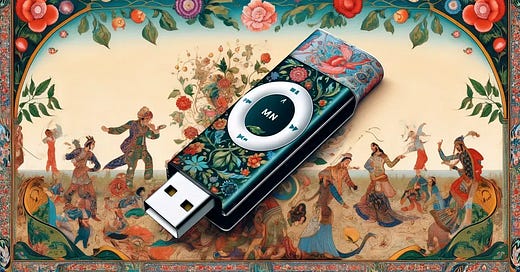On music and digital psychology
Some unprocessed thoughts on my music journey and the significant role of my favourite iPod shuffle
I’ll still never forget witnessing the moment my grandmother came to life when we played a cassette tape for her. I could see time switching back, her eyes bloomed and she started talking again. The heavy burden of Alzheimer’s lifted for that brief moment. Her demeanour completely changed under the spell of a song.
Music is undeniably a special thing 𓇢𓆸
Songs help us remember our lives, like little time capsules that throw us back into a different place. Music also helps us process emotion, even helping us to understand how we feel.
So naturally music shifts and extends itself with us as we evolve and develop our worlds, and this includes our technology. Hearing about Spotify’s recent AI-powered playlists prompted me to reflect on my musical journey and the world it has created for me.
𐀔 Exploration 𐀔
I grew up with my iPod shuffle, the old USB one. I was happy listening to an eclectic mix of music on this, waiting eagerly to see what the next song would shuffle on. Back then I was collecting songs from CDs and USBs I traded with friends, and free downloads from old newsletters like RCRD LBL.
Nowadays I like to spend time on SoundCloud, YouTube, Bandcamp, and Spotify. I’ll Shazam something I hear while dancing with friends or walking alone at the grocery store. I’ll even save songs from other people’s Instagram stories.
I’ve realised over time that I just love absorbing these tidbits from life, it’s like taking an audio snapshot of an experience. And with so many experiences and twists in life, I’ve relied on music to take me back to familiar moments and ideas.
✧ Fragmentation ✧
All these different music platforms and ways of finding music add more dimension. It’s pretty hard to find music that unites us these days, everyone seems to be in their own corner. Nostalgia is good at bringing some of us back together, old bands and artists who were repetitively played on sound systems back in the day.
The notion of Spotify’s algorithmic playlists raises this question about the balance between mainstream appeal and niche exploration. I see these two factors as different parts of a landscape. Where mainstream is the main road, exploration is the little winding path in that hillside town.
The main thing about mainstream is the convenience and accessibility. It’s easier to find, it’s played in a generic setting. The best thing is that it’s like a highway, you find a lot of people there. I have a feeling that what we’ll consider mainstream will be less likely a song or band that everyone’s heard, and instead a familiar sounding genre that appeals to a lot of people.
❀ Curation and imperfection ❀
The introduction of AI-generated playlists marks a significant shift in how we consume music, catering to individual preferences and contexts. Suddenly the art of curation is open and more accessible. Curation is a creative act (ever wondered why so many people dabble in DJing?). It’s likely that the accessibility and convenience of an AI-powered playlist will create average results as well as new dimensions of brilliance, just as it has with music software.
The underground music scene thrives on experimentation and imperfection. Deliberate glitches, speed changes, and unmatched keys add character and depth to the listening experience. Can algorithms capture the rawness and spontaneity that define these unconventional sounds? Will we find new ways to express imperfection and novelty?
I love listening to the thematic and explorative nature of curated DJ sets. These sets transcend mere song selection, weaving narratives and emotions across genres and tempos. A set that only plays the same genre is a bit boring for me, because I want to learn. I want a gauge of someone’s inner world by hearing an alchemy of sounds and genres.
ꕥ Wholeness in chaos ꕥ
From the randomness of the first iPod shuffle to the chaos of managing vast digital libraries, I like to embrace the unpredictability of music discovery. AI playlists offer a glimpse of order in this chaos. Maybe it runs the risk of diluting the essence of each unique track. Who knows, it’ll be up to you — the listener and creator.
I don’t really have an opinion on whether we’re sacrificing authenticity for accessibility. But I am excited to see what the next wave of innovation in music expression will be.
What won’t change is the fact that our brains love patterns, our brains also love surprise. Too much repetition causes the brain to zone out, we habituate. And there’s a place for that (ie 3 hour long ambient sounds for deep work).
What we listen to and resonate with will be a reflection of our inner and outer worlds. We will be both fragmented and whole at the same time. Exploring our niche music taste and finding a new sense of identity in casting our nets wider.
𖥸 Connection 𖥸
While platforms like Bandcamp foster connections with local artists and Soundcloud offers a space for experimental sounds, I wonder if Spotify's algorithmic approach will be able to maintain any authentic relationships. As playlists evolve and memories fade, the challenge lies in preserving the personal narratives woven into each song.
While AI playlists offer convenience and novelty, it’s another iteration for accessibility. It may pose a challenge to the authenticity of our musical experiences, but it also opens the door for new dimensions in expressing.
Anyways, I hope my future grandkids will have a good time playing my extensive playlists for me.
⋆⭒˚.⋆⁺‧₊˚ ཐི𖥸ཋྀ˚₊‧⁺⋆.˚⭒⋆







